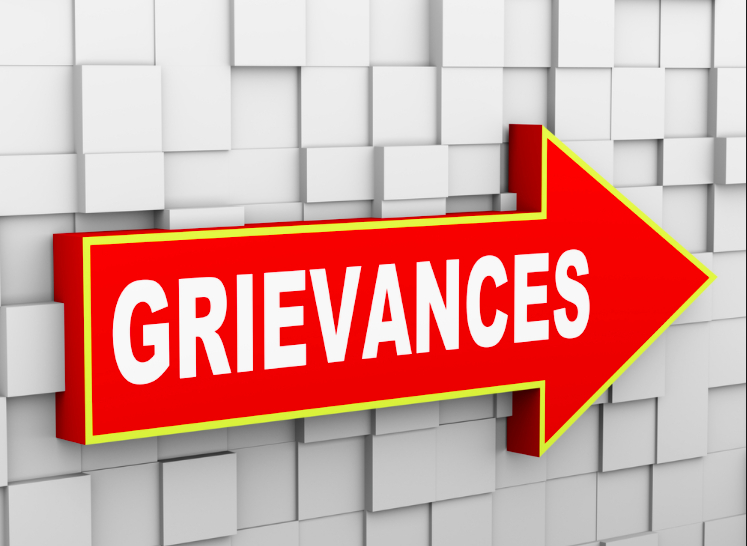Grievance Handling
Grievance
handling is an important aspect of human resource management (HRM) that
involves the resolution of workplace issues or complaints. A grievance is any
complaint that an employee may have about their job, working conditions, or
treatment by management or colleagues. Effective grievance handling is crucial
for maintaining a positive work environment and for ensuring that employees
feel valued and respected. When grievances are not addressed or are mishandled,
they can lead to low morale, decreased productivity, and even legal issues. HRM
professionals play a key role in handling grievances by providing a fair and
impartial process for employees to raise their concerns and ensuring that these
concerns are addressed in a timely and appropriate manner. This can involve
investigating the issue, engaging in mediation or conflict resolution, and
implementing solutions to address the underlying causes of the grievance.
Effective grievance handling can improve employee morale, job satisfaction, and
retention, ultimately benefiting the organization as a whole.
There
are several theories related to grievance handling in HRM, including:
- Equity theory: This theory suggests that individuals compare their inputs (e.g., effort, skills, experience) to their outcomes (e.g., pay, benefits, recognition) with those of others in the organization. If an employee perceives an inequity in this comparison, they may file a grievance.
- Expectancy theory: This theory suggests that employees are more likely to file a grievance if they perceive that their efforts will not lead to desired outcomes or rewards, such as recognition or promotion.
- Attribution theory: This theory suggests that employees may file a grievance if they perceive that their negative outcomes are due to factors beyond their control, such as discrimination or unfair treatment by management.
- Social exchange theory: This theory suggests that employees are more likely to file a grievance if they feel that their contributions to the organization are not being reciprocated with fair treatment, respect, and support.
Understanding these theories can help HRM professionals develop effective grievance-handling policies and procedures that address the underlying causes of employee grievances and promote a positive work environment.
Conclusion
grievance
handling is an essential aspect of human resource management that involves the
resolution of workplace complaints and issues. Effective grievance handling can
help maintain a positive work environment, improve employee morale and job
satisfaction, and prevent legal issues. Understanding the underlying theories
related to grievances can help HRM professionals develop effective policies and
procedures for addressing employee concerns and promoting a fair and respectful
workplace. By providing a fair and impartial process for employees to raise
their concerns and addressing the underlying causes of grievances,
organizations can foster a culture of open communication, trust, and mutual
respect, ultimately benefiting both employees and the organization as a whole.
References
Fells,
R. E. (2016). The role of human resource management in the prevention and
resolution of workplace grievances. International Journal of Human Resource
Management, 27(16), 1894-1914. doi: 10.1080/09585192.2015.1071908
Mukherjee,
S., & Ahmed, N. (2017). An empirical study of grievance handling procedure
and its impact on employee satisfaction in Indian industries. International
Journal of Business and Management Invention, 6(9), 34-41.
Obidigbo,
C. O., & Okonkwo, E. C. (2019). Investigating grievance handling practices
and employee perceptions of organizational justice in Nigerian firms. Employee
Relations, 41(5), 922-939. doi: 10.1108/ER-10-2018-0287
Pan,
Z., Chen, C., & Huang, Z. (2019). The impact of procedural justice on
employee grievance behavior: The mediating role of employee trust. Frontiers in
Psychology, 10, 2164. doi: 10.3389/fps.2019.02164




A great topic has been chosen Charith. Khan, A. (2020) any true or imagined sense of injustice or dissatisfaction that an employee feels toward his or her employment, the nature of the job, or the management's rules and processes is considered a grievance. Any unhappiness or dissatisfaction with something about the company that an employee feels is unfair, unjust, or inequitable constitutes a grievance, regardless of whether it has been aired or not and regardless of whether it is justified. Grievances may occur for various reasons such as employment issues, economical issues, work environment issues, employee relations issues, etc.
ReplyDeleteGrievance handling is an important aspect of employee relations and involves the resolution of conflicts or complaints raised by employees regarding their work, workplace, or work conditions. Effective grievance handling can help to improve employee morale, satisfaction, and productivity. Here are some key steps to follow when handling employee grievances
Delete